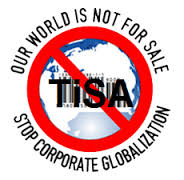Opposition to status-quo trade deals has reached unprecedented heights. The entire 2016 election cycle featured a widespread, trans-partisan rebuke of trade deals like the Trans-Pacific Partnership that prioritize corporations over the rest of us.
 And while Donald Trump eventually, and tragically, ascended to power, he did not stop the TPP. That was the work of an international movement, including millions of Americans and thousands of diverse organizations that fought for six years against the TPP’s threats to workers, communities, and the environment. lana Solomon Director, Responsible Trade Program, Sierra Club and Ben Beachy Senior Policy Advisor, Responsible Trade Program Sierra Club lay it out for us.
And while Donald Trump eventually, and tragically, ascended to power, he did not stop the TPP. That was the work of an international movement, including millions of Americans and thousands of diverse organizations that fought for six years against the TPP’s threats to workers, communities, and the environment. lana Solomon Director, Responsible Trade Program, Sierra Club and Ben Beachy Senior Policy Advisor, Responsible Trade Program Sierra Club lay it out for us.
To build a new approach to trade that supports – not undermines – climate action, we must turn the status quo model on its head. We start from a simple premise that is fundamentally at odds with the status quo: Trade and investment should be treated as tools for advancing human priorities – not ends in and of themselves. Deals should encourage trade and investment that support a more stable climate, healthy communities, and good jobs, while discouraging trade and investment that do the opposite.
We offer 15 proposals for how to bring decades-old trade rules into alignment with today’s climate imperatives. These proposals have been informed by input from over 50 academic and civil society trade and climate specialists. They range from the relatively simple to fundamental shifts that, while difficult, may be necessary to achieve trade policies that actually reflect today’s stark climate realities. Our proposals seek to fulfill three core goals:
1. Changing trade rules to protect climate policies: Trade rules that conflict with climate action should be eliminated to allow communities and governments to advance bold climate protections without fear of being challenged in trade tribunals. Our proposal would not allow corporations to sue governments in private tribunals over climate policies – or any policies. Another proposal would require the U.S., India, and all countries to stop attacking each other’s “buy local” renewable energy policies at the World Trade Organization. We also propose a straightforward provision stating that whenever trade rules clash with climate policies, the climate policies win.
2. Using trade rules to increase climate protections: Trade pacts should establish a floor of climate protection among trade partners to avoid a race to the bottom in climate standards. While status quo deals like the TPP don’t even mention the words “climate change,” tomorrow’s trade agreements should require enforcement of international climate commitments, elimination of fossil fuel subsidies, and financing for renewable energy investments. Under this new model, if a government or corporation failed to live up to its climate responsibilities, the communities most affected by climate change could seek justice before a panel of climate experts.
3. Mitigating the climate impacts of trade: A climate-friendly trade model should encourage trade in goods that support the public interest, but discourage trade in climate-polluting fossil fuels. Trade pacts also should tackle climate pollution from shipping – we propose a new way to do so. And to ensure that a country’s climate protections don’t offshore jobs or climate emissions, trade agreements should include taxes on imported goods made under highly climate-polluting conditions.
These proposals, and others detailed in our discussion paper, will be further refined as we continue to collect feedback on what climate-friendly trade policies could look like. Please help us build a new trade model by sending your input to climate-friendly-trade@sierraclub.org.
We look forward to working with our grassroots and our partners to stitch these climate-focused ideas into a broader proposal for a new approach to trade that promotes good jobs, healthy communities, and a livable planet. Using our grassroots power, and momentum from the diverse movement that defeated the TPP, we are eager to build support for this new approach that puts people and planet over profits.
